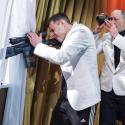Jeff Goldblum is a big guy, 6'4" tall to be precise, and, though his character inhabits an improbably spacious, high-ceilinged New York apartment, he roves around it like a crazy caged animal in this intensely athletic and entertaining revival of Neil Simon's disturbing 1971 comedy. There's an unmissable topicality to the theme - the cataclysmic effect of redundancy on a high-earning executive - and, while the production doesn't underline this or update the story, it comes up looking as fresh as paint - fresher, certainly, than the overpriced, sweaty, crumbling hellhole where the action is entirely set.
In this tarnished cage on the Upper East Side (Rob Howell's production design nails the full grimness of beige, spindly-legged early 1970s interiors), against the backdrop of a midsummer heatwave, Mel Edison, 47, is losing his cool, his job and, imminently, his mind. An Everyman from the disaffected middle-classes, he rails against the kaput air conditioning, the leaky toilet, the party-girl Lufthansa air hostesses in the adjoining apartment and the iniquity of the universe at large.
Experiments show that mice can get... cancer (Mel can barely bring himself to mutter the dreaded c-word) when fed Graham crackers, he has already spent thousands of dollars on psychoanalysis, only to have the shrink commit the ultimate betrayal of dying on him and cod television newsflashes screened between the acts paint an image of a city crumbing into tragi-comical chaos. Even the anchorman gets mugged.
In the early 1970s, New York was blighted by crime, while the nation lived under the cloud of the Vietnam War, the political assassinations of the Sixties and the gathering recession; Watergate, of course, was just around the corner. In cinema, this period inspired a magnificent suite of melancholy conspiracy thrillers, from Chinatown to The Parallax View, and Simon's play looks very much now like a theatrical manifestation of that same Zeitgeist - one which, it goes without saying, bites just as hard today. "Nothing is safe any more," its characters fret. They thought America was such a strong country, but - and if the play has a moral, it is this - self-help rules when the crunch comes, you can only count on your own resources.
As the weeks pass, Mel descends into deeper paranoia: they (he's not sure quite who) are plotting to take over: it must be true because he heard it on the radio. This could be played as ultra-neurosis- as Jack Lemmon did in the 1975 screen version - but Goldblum, who's already a little bit, well, out there to begin with (check him out in the trailer for the show below) takes the character right to the outer fringes of weirdness.
Prisoner offers a rare chance to catch two American actors at the top of their game. Goldblum's sole previous West End appearance was opposite Kevin Spacey in the Old Vic's acclaimed production of Speed-the-Plow, while Mercedes Ruehl makes her very welcome London debut as his peppy, can-do wife who, as the play proceeds, turns manic as she starts to crack under the strain of becoming the family breadwinner. Simon is extremely sharp at charting the couple's shifting dynamic as each in turn takes the helm to guide them through the crisis.
In essence a two-hander, Prisoner lurches into a different gear late in the game as the curtain rises to discover the apartment minus Goldblum and Ruehl and plus four people we're clapping our eyes on for the first time: Mel's brother and three sisters, who suddenly unveil a back story about his childhood and develop the play's self-help theme. The scene is often seen as a structural faultline and Terry Johnson's otherwise tightly controlled production for the Old Vic doesn't paper over the cracks. The actors struggle to bring their underdrawn characters alive and credibility isn't helped by the fact that Goldblum looks (and indeed, at 57, is) a bit too old for the role. Towering over his stage siblings he neither resembles them physically nor comes across as the supposed baby of the family.
Still, the success of the play depends on the chemistry between its leads and here Goldblum and Ruehl establish a lovely, warm rapport, with a hint of sexual frisson and an energy that extends to the curtain call.
By the end, as the first snowflakes of winter fall, a resolution of sorts is achieved, which is not to say that this is a sentimental feel-good piece: it's surely not by coincidence that the poster, which depicts the couple side by side staring balefully as Goldblum brandishes a shovel, seems designed as a modern urban variant of Grant Wood's eerie, iconic American Gothic. The battle, most definitely, continues.















Add comment